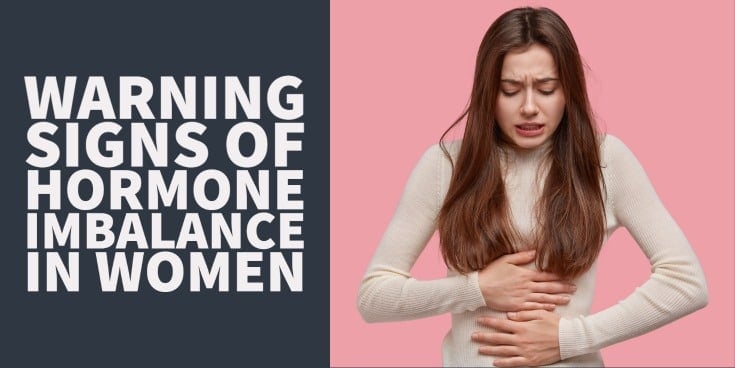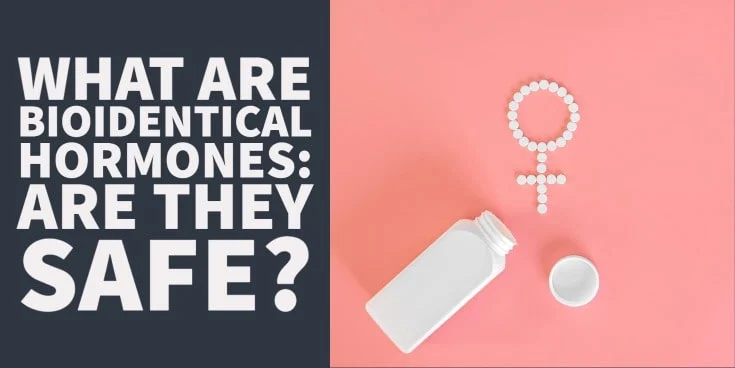Are you suffering from depression, weight gain, hot flashes, or menstrual irregularities?
Are you approaching the age of 50?
If so, then these symptoms may be attributed to the decline in important sex hormones which is seen during the menopause transition.
You can easily identify if you are in menopause with some very simple tests.
In this guide, you will learn more about the best tests for menopause, how to identify if you are in this transition period, the symptoms associated with this transition, and how to use your lab tests to help you with treatment options.
Let’s jump in:
Menopause Basics
Menopause is something that all women will go through at some point in their lives.
These hormones are critical for the maintenance of several important functions in the body such as the regulation of your mood, the regulation of your weight, modulating sex drive, and much more.
This sudden drop in hormones (termed ovarian failure) results in these symptoms BECAUSE of the drop in hormones.

Understanding this condition more fully will help you understand what is happening in your body and will help you cope with your symptoms and help you to understand your treatment options.
The vast majority of women who go through menopause will not get “treatment” for this condition and instead will occasionally take medications designed to blunt the symptoms associated with this condition.
But make no mistake:
There is a lot of debate about how to do this correctly, or even if it should be done, but let me tell you that it can be done safely and effectively by using certain hormones that may be life-changing.
But how do you know that you are in menopause?
How do you know that your symptoms are related to a drop in your hormones and not something else?
After all, symptoms such as depression and weight gain can be attributed to many other conditions, not just changes in your hormones.
It may surprise you to know that most women are diagnosed with menopause simply from symptoms alone and based on their age.
While this may work for some women, it doesn’t necessarily work for all.
Especially those who are going through early menopause or whose symptoms are not “typical”.
That’s where lab testing steps in.
Testing for Menopause & Early Menopause
Is it possible to test for and diagnose if you are in menopause?
The answer is yes.
The changes in your hormones (that were described above) cause several changes to other hormones in your body which can be picked up with routine blood tests.
What you need to realize is that all of the systems in your body are connected in some way.
If you drop your estrogen, for instance, then that will alter other hormones that are normally produced by your brain to stimulate the release of estrogen.
These hormones and prohormones can be picked up and used to help draw a picture of what is happening in your body.
So which blood tests do you need to diagnose menopause?
I’ve included a list below that every woman who is going through menopause should ask their doctor for:
- FSH (Follicle stimulating hormone) (3) – FSH is released from your pituitary gland with the goal to stimulate your ovaries. Checking your FSH can help you understand how your brain is communicating with your ovaries.
- Leutinizing hormone (LH) (4) – LH is also released by the pituitary gland (in your brain) and acts synergistically with FSH. It helps to trigger ovulation during your menstrual cycle and cycles along with progesterone, estrogen, and FSH.
- Serum progesterone (5) – Progesterone helps to balance the powerful effects of estradiol and is one of the most sex hormones in the female body. Progesterone starts to decline at around age 35 and continues to decline to near-zero levels after menopause. Progesterone is available over the counter (as a cream) and can be effective at reducing the symptoms of menopause.
- Serum estradiol (6) – Estradiol is the most powerful estrogen in the female body and this hormone helps to promote breast tissue growth, endometrial growth, manage your mood, your appetite, and even your weight. Estradiol declines (along with progesterone) to near-zero levels in many women during menopause. Most of the symptoms associated with menopause stem from the decline of this hormone. Estradiol can be given to women in the form of biest (or other formulations) to help eliminate the symptoms of menopause.
- Sex hormone binding globulin (7) – Sex hormone binding globulin is a hormone that binds to testosterone. High levels of SHBG can help you understand what is happening to other hormones in your body. SHBG increases/decreases in response to estrogen which makes it an important part of hormone testing.
- Testosterone (free and total) (8) – Testosterone is important for both men and women. Testosterone, in women, helps to manage lean muscle mass, and helps promote weight loss and even libido. Always test testosterone in conjunction with other sex hormones (estrogen + progesterone).
It’s also helpful to understand what happens to these values during menopause so that you can understand where you are at in your transition.
I’ve included some of the general ranges to look for with these lab tests below:
- FSH (Follicle stimulating hormone) – During menopause FSH will INCREASE. An FSH of 40 IU/L or higher is a strong marker for menopause (9).
- Leutinizing hormone (LH) – Like FSH, LH will also increase during menopause.
- Serum progesterone – Progesterone levels will drop to near zero levels during menopause. During the transition phase, your progesterone may fluctuate but will almost always be in the bottom 20% of the “normal” reference range.
- Serum estradiol – Estradiol drops in about 60% of women down to very low levels (sometimes less than the detectable level by lab tests). Up to 40% of women may retain some estradiol during menopause but the value is almost always very low.
- Sex hormone-binding globulin – SHBG may drop during menopause due to the drop in estradiol. A low SHBG can also be an early indicator of thyroid disease.
- Testosterone (free and total) – Both free and total testosterone tend to drop during menopause and may contribute to weight gain, decreased libido, and other issues.
Testing + Symptoms = Diagnosis
Both lab tests and symptom charting are not necessarily 100% accurate.
The problem with menopause is that it occurs over a period of several months (10) (sometimes 6-12 months).
This time is a period of great fluctuation, both in terms of your symptoms and in terms of your lab tests and hormones.
Your hormones and prohormones may fluctuate wildly during this time which means that checking just one time may not necessarily be accurate.
As a woman is going through the menopause transition it’s not uncommon for her body to attempt to menstruate.
This attempted menstruation may cause small to large rises in hormone levels which may alter your symptoms.
Because of this, you don’t want to rely heavily on one form of diagnostic tool over another.
Instead, it’s best to combine both your symptoms and use them in conjunction with your lab tests (listed above).
This is especially important if you are suffering from early menopause.
Women who suffer from early menopause may be pushed aside as having depression as opposed to true ovarian failure/menopause.
The good news is that it is easily testable and that you can be sure of what is happening in your body with a couple of lab tests.
For instance:
During menopause, we know that your estradiol levels and progesterone levels WILL fall dramatically.
When in doubt, make sure to ask your doctor for the lab tests listed above as they may help to explain what is happening in your body.
Why Testing is Important
Perhaps the most important aspect of testing has to do with what you do with that information.
What I’m referring to is the treatment for menopause.
Knowing you are in menopause is only a small part of the battle.
The next most important step is what you decide to do as a result of that information.
As a woman, you will find that menopause hits certain women harder than others.
Some women can go through their life with a few hot flashes and maybe some minor weight gain while others can be completely incapacitated.
The decision to use treatment largely depends on you and how badly you are suffering from symptoms.
The good news is that there is a VERY effective treatment for menopause known as hormone replacement therapy or HRT.
The goal of HRT is NOT to give you more hormone than you need or to bring back your menstrual cycle or anything like that.
It’s simply to provide your body with the exact replica of the youthful hormone that your body has been used to for decades (since you started menstruating) to help reduce your symptoms and improve your quality of life.
HRT has been shown in many studies to completely reverse the symptoms associated with menopause in a matter of days.
Why?
Because menopause is the result of the DECLINE in these hormones, it makes perfect sense that the treatment would be to provide your body back with these hormones.
Despite this many providers may still be reluctant to use HRT for menopause and may instead opt for other therapies such as anti-depressant medications.
This type of approach only masks the symptoms without actually treating the root cause (the drop in hormones).
It may work for some women, but there will be plenty of women who will continue to experience significant symptoms.
If you know that you are in menopause, and diagnosed with lab tests and symptom checklists, then your best option for relief may be to see a physician who specializes in hormone replacement therapy.
Conclusion
Testing for menopause is relatively easy and can help you to confirm that you are in menopause.
The symptoms of menopause can be vague and differ from person to person, so using a tool such as lab tests can be effective in helping you understand what is happening in your body.
These tests are covered by insurance and are relatively easy to interpret and understand.
All women who suspect they are in menopause (or perimenopause) can benefit from routine hormone testing.
Once you know that you are in menopause then you can explore treatments such as HRT to help manage your symptoms.
Now I want to hear from you:
Do you suspect that you are in menopause?
Have you had your hormones tested?
Have you thought about treatment for HRT for menopause?
Leave your comments below!








